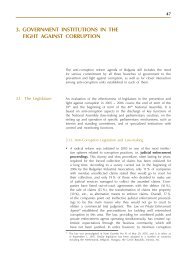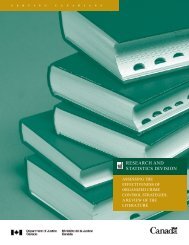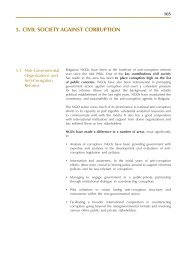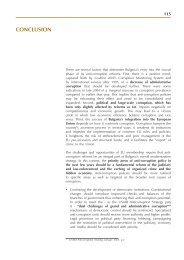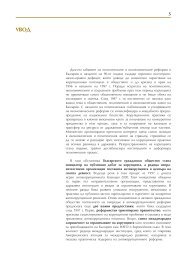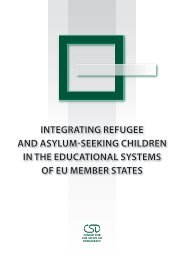National Threat Assessment 2008. Organised Crime - Politie
National Threat Assessment 2008. Organised Crime - Politie
National Threat Assessment 2008. Organised Crime - Politie
Create successful ePaper yourself
Turn your PDF publications into a flip-book with our unique Google optimized e-Paper software.
customers. Customers must be on the lookout for fraudsters and must ensure<br />
that their computers are properly secured and remain that way. The level of<br />
direct and indirect losses incurred by private individuals and companies in<br />
the Netherlands is unclear.<br />
5.5.6 <strong>Crime</strong>-related factors and expectations<br />
Nowadays an increasing number of people have a PC with Internet access and<br />
a broadband connection. PCs with this type of connection are ideal for Internet<br />
criminals to include in a botnet. People in the Netherlands are shopping online<br />
and using Internet banking facilities to an increasing degree (66% and 72% of<br />
people respectively in 2007). The number of credit card payments is also still<br />
increasing. With credit cards there is the risk that criminals will obtain the card<br />
details and use them to place orders and make payments. To prevent misuse, the<br />
business community has developed initiatives such as PayPal and iDeal to make<br />
payments more secure. However, PayPal turns out to be vulnerable to phishers<br />
as well. With iDeal consumers pay directly online at their own Internet banking<br />
site using two-factor authentication. The government and the banks are running<br />
campaigns to raise the public’s awareness of the lack of security on the Internet<br />
and the need to secure their home computers.<br />
It is not only consumers who have difficulty finding out who sends or receives<br />
information, investigating agencies have similar problems. Clues often lead<br />
via various links to possible criminals in other countries, which means that<br />
investigations are time‐consuming. Internet criminals do not have to worry<br />
about communication problems, arranging the necessary authorisation and<br />
technical tools. On the contrary, they benefit from the speed and anonymity<br />
of the Internet. More attention is currently being paid to the fight against<br />
ICT-related crime. The <strong>National</strong> <strong>Crime</strong> Squad at the KLPD has set up the High<br />
Tech <strong>Crime</strong> Team. This team also carries out investigations into phishing.<br />
Technological developments are increasing the number of options for phishers.<br />
Whether the method involves WiFi, VoIP, SMS, smart phones, multiplayer online<br />
games (MMOGs) or Instant Messaging (IM), more and more routes are being<br />
created for fraudsters to use to rob people of their identity details. Spy phishing<br />
will be increasingly used in this process because it is then no longer necessary to<br />
mislead digital users into disclosing their details since the details are intercepted<br />
by malware without the user noticing anything. The classic form of phishing will<br />
occur less and less frequently, partly because Internet users are becoming<br />
increasingly aware of the existence of misleading emails. Malware will probably<br />
be designed in an increasingly advanced and specific manner. If misleading<br />
tactics are still used, the expectation is that they will also become increasingly<br />
200 <strong>National</strong> <strong>Threat</strong> <strong>Assessment</strong> 2008 – <strong>Organised</strong> crime



